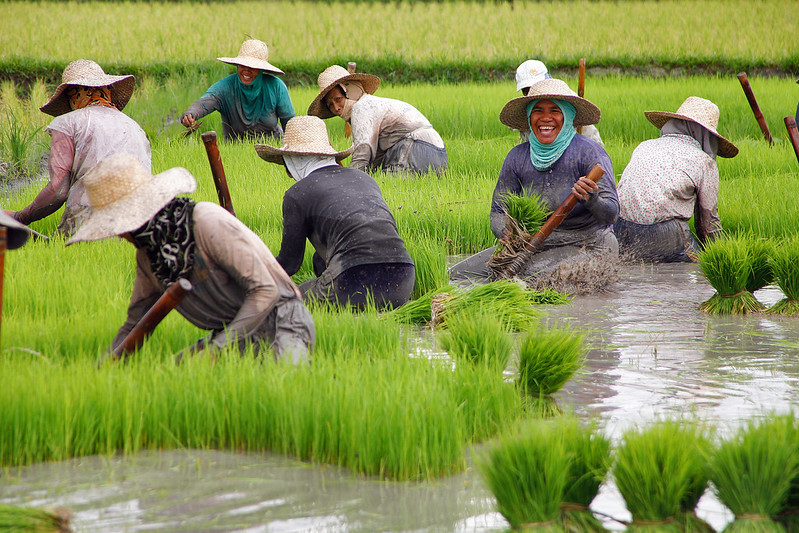Digital Solutions: AgriDigital Reduce Rural Poverty
 With nearly two-thirds of those living in extreme poverty worldwide working in agriculture, increasing farming output can directly reduce poverty. Researchers suggest that to achieve this agricultural growth, countries need to boost rural productivity, instead of increasing farmers’ inputs or resources. According to the World Economic Forum, increased productivity in agriculture reduces poverty at a higher rate than increased productivity in all other sectors, including manufacturing. This is where AgriTech businesses can lend a hand.
With nearly two-thirds of those living in extreme poverty worldwide working in agriculture, increasing farming output can directly reduce poverty. Researchers suggest that to achieve this agricultural growth, countries need to boost rural productivity, instead of increasing farmers’ inputs or resources. According to the World Economic Forum, increased productivity in agriculture reduces poverty at a higher rate than increased productivity in all other sectors, including manufacturing. This is where AgriTech businesses can lend a hand.
Rural Poverty: Background
The AgriTech sector, an industry that provides technological solutions to agricultural problems, has surged in recent years, with an average of 1,522 new companies founded annually in the past decade. This comes at a time when global agriculture has faced numerous threats, from supply chain shocks during the COVID-19 pandemic, to a changing climate that threatens global crop supplies, to the ongoing conflict in Ukraine, which has raised food prices worldwide.
Brookings suggests that increasing agricultural productivity can directly reduce poverty, with a 1% increase in agricultural GDP creating a greater than 1% decrease in poverty. AgriTech businesses should help boost this productivity. Instead of increasing the resources available to small rural farmers, these companies help producers reach the market, make informed decisions through data, and gain access to key lines of credit and funding.
This article will highlight three AgriTech companies in three different countries and examine how these digital solutions can help reduce rural poverty and help farmers grow their businesses from subsistence activities to free-market enterprises.
AgriDigital
AgriDigital is a digital management platform that helps participants across the agricultural supply chain manage their business and make sales. Based in Australia, AgriDigital uses blockchain technology—the same digital ledger that’s behind the world’s leading cryptocurrencies—to allow buyers and sellers to make safe transactions through their platform.
Enabling online transactions between members of the agricultural supply chain is only one of AgriDigital’s many functionalities. The platform also allows users to manage inventory and deliveries, send invoices, connect with other partners in the supply chain and utilize their data to make informed business decisions. The software is designed to help each of the different roles across the supply chain, including farmers, site operators, grain traders, and brokers.
Apollo Agriculture
Apollo Agriculture helps Kenyan and Zambian farmers gain access to financing. The company allows farmers to buy inputs directly on their site. If a farmer is cash-strapped and needs to buy on credit, Apollo will give them a loan with favorable repayment conditions. The farmers also receive free insurance on purchases bought with credit in case of an emergency.
Apollo connects farmers with nearby agrodealers who also use the site. In helping both dealer and farmer buy and sell inputs where needed, Apollo fills the same intermediary role as AgriDigital, providing a platform to connect various members of the supply chain. Apollo also provides training for farmers and logistics for agrodealers.
Mayani
Mayani is a company from the Philippines that helps agri-fishery businesses sell their products to local businesses. With 2% of the country’s GDP consisting of aquaculture, Mayani helps fisheries weather the seasonal spikes that leave fishermen and women at the mercy of volatile prices. The business helps these fisheries and farms find partner businesses such as restaurants, hotels and supermarkets in a B2B format. These partner businesses gain access to sustainably sourced, quality local ingredients. Households can also use the platform to find fresh produce for the home kitchen. Mayani, while acting as an intermediary, also performs quality control on products delivered from the farm to the kitchen/market.
Technology Solving Rural Problems
The three companies surveyed above are just a small sample of the larger AgriTech sector that creates efficient ways to boost productivity and reduce rural poverty. They also perform just a small subset of the total functions that AgriTech businesses provide.
AgriDigital also helped customers manage their business, while Apolo Agriculture provided training and financing.
However, Brookings notes several other functions that AgriTech businesses perform. These include mechanization processes like IoT sensors that help farmers increase crop production, or traceability capabilities that allow products to be tracked through the supply chain, ensuring responsibility for quality products.
International poverty has decreased where crop productivity has increased. In East Asia, where many countries have climbed the economic ladder, crop yields have multiplied by a factor of six in the last 40 years. In Sub-Saharan Africa, however, these crop yields have doubled, Brookings reports.
The Future of Rural Poverty
If agricultural productivity is inversely related to global rural poverty, then businesses must focus their efforts on increasing this productivity. AgriTech businesses like AgriDigital, Apollo Agriculture, and Mayani are working towards this goal. By training farmers in useful skills, helping farmers make better business decisions through data collection, giving farmers much-needed access to finance and inputs, simplifying complex business management into simple, easy-to-use applications and connecting different groups of the supply chain together through effective intermediary platforms, these companies work to reduce rural poverty. Helping smallholder farmers gain access to markets ensures that the two-thirds of the world’s poorest who are employed in agriculture can escape rural and overall poverty and become small business owners in their own right.
– Charles Citron
Charles is based in Boston, MA, USA and focuses on Business and Politics for The Borgen Project.
Photo: Flickr
